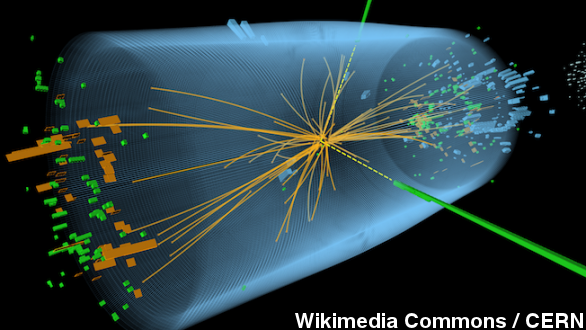Scientists at CERN made two announcements Monday, one letting the world know that, yes, that really was the Higgs boson they found, and the other letting us know to expect more proton smashing at the Large Hadron Collider early next year. (Via Wikimedia Commons / Maximilien Brice, CERN, Connor Behan)
The announcement that the Higgs boson had been discovered in 2012 was probably the LHC's biggest media moment, helped along by headlines throwing around the term "god particle." But once the Higgs had been found, there was still the task of figuring out what it's like and how it behaves. (Via CERN, Daily Mail, USA Today, Mashable)
Cue Monday's paper, published in the journal Nature Physics. Turns out the elusive Higgs acts pretty much how scientists expected it to act.
Basically, scientists had been looking for what happens to the Higgs after it's created. It was thought to quickly decay into bosons or fermions, two different classes of particles. Up until this paper was published, only the first class had actually been witnessed. (Via YouTube / TheATLASExperiment)
Now, scientists have seen both, meaning the particle continues to match theoretical predictions. But that's kind of a double-edged sword for physicists.
The Higgs boson was the last missing piece of the Standard Model of particle physics, a theory that describes how subatomic particles behave. (Via Fermilab)
But several writers commenting on the story shared the view that it would have been much more interesting for the Higgs to do something else. A writer for ExtremeTech says, "If its decay path had been slightly different ... then whole new avenues of research would've opened up." A writer for ValueWalk says "With this new evidence the chances for a big surprise seem even more remote." (Via Wikimedia Commons / Lucas Taylor)
That brings us to CERN's other announcement: when the LHC will start looking for more surprises.
The giant particle smasher was shut down for upgrades in early 2013. The new equipment will allow the LHC to run at almost twice the energy it did before. (Via CERN)
CERN's director said, "It's effectively a new machine, poised to set us on the path to new discoveries."
It might, for instance, be able to discover evidence of dark matter or dark energy, the mysterious stuff that makes up most of our universe. (Via NASA)
If everything goes according to plan, the LHC will be brought online and tested a few systems at a time, with the first new physics experiments expected to begin in the spring of 2015.


